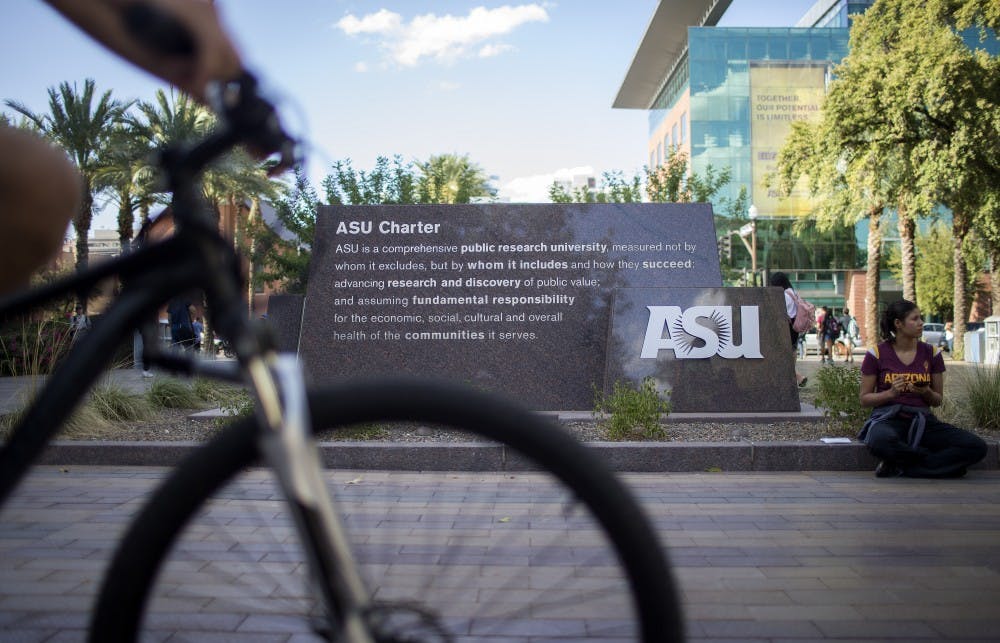Educators in ASU’s School of Social Transformation and 10 other ASU organizations sponsored a teach-in event Wednesday to open discussion about structural racism, anti-Blackness and police violence as a part of the National Scholar Strike.
The event was held from 12 p.m. to 3 p.m. via a Zoom webinar and YouTube livestream as a continuation of the two-day event that began Tuesday with Barrett, the Honors College.
According to a post on Academe Magazine's blog, associate professor Anthea Butler of the University of Pennsylvania and professor Kevin Gannon of Grand View University took inspiration from protests against racial injustice by professional athletes in the NBA, WNBA and MLB and organized a nationwide action called #ScholarStrike.
Educators participating in the event around the U.S. refrained from their usual duties and participated in activities designed to spread awareness and show solidarity to their BIPOC students and colleagues.
Though it was established outside of the University, faculty from the 11 colleges, centers and institutes sponsoring the ASU event organized the teach-in with the goal of providing the University community with resources and discussions to develop understanding of structural and systemic racism, including anti-Blackness and police violence.
READ MORE: Barrett faculty participate in National Scholar Strike for Racial Justice
Mako Ward, faculty head of African and African American studies, said COVID-19, the Black Lives Matter movement and racial injustice called for every institution to ask two questions of themselves:
"What would a day without scholars of color look like in your institution or people of color in your institution look like?" and "How is my institution engaging in processes that will reimagine my institution as a more just and inclusive space?"
She said the event is a “teaching moment” to offer participants from the ASU community historical context and reflection on why scholars and educators are participating in the two-day strike.
“ASU is just one of many higher education institutions that's being called to be more inclusive and to do the work,” Ward said. “I think that this is just an opportunity for us to amplify many of the people who have been doing that work at ASU for a very long time.”
The first two hours of the live-streamed event featured speakers who provided historical context, data and perspectives on issues impacting BIPOC including anti-Black schooling, community loss, emotional trauma and allyship.
Benny LeMaster, assistant professor at Hugh Downs School of Human Communication, said they attended the event to stand in solidarity and reflect on how racism affects academic institutions.
"I usually pass as white which means I am treated typically like a white person," LeMaster said. "So in that regard, this is about me amplifying Black voices, Indigenous voices and other POC voices in my teaching and in my research."
Additionally, student leaders from the Black African Coalition, El Concilio, Women's Coalition and Multicultural Solidarity Coalition explained goals for their groups during the live stream.
Aniyah Braveboy, president of the Black African Coalition, said ASU's Council of Coalitions consists of seven identity-based student groups representing the underrepresented minorities at ASU. The council is dedicated to finding solutions to issues students of color are facing on campus and supporting the other groups in the coalition.
"I believe that it's important for all of us to continue to join together to have strength in numbers and provide the execution and to make sure that we are standing together, standing for our students and continuing to get work done," Braveboy said.
Kierra Otis, a gender studies Ph.D. student, said the MSC has been working to revive the presence of multicultural centers on ASU's four metropolitan campuses since 2016.
Though it is not a University sponsored organization, the group has called for the University to update their multicultural website with accurate data on race representation, hire more BIPOC faculty, create a physical space for marginalized students and to defund and disarm the ASU Police Department.
During the last hour of the teach-in, participants were put into Zoom breakout rooms for small group discussions. In the groups, members discussed notable points presented in the webinar alongside a faculty moderator facilitating discussions.
LeMaster said they hope this event initiates change in curriculum to reflect and include the diverse communities of ASU, especially in the University's faculty.
"I'm hoping that this also means that we see that faculty hires more people of color, particularly Black and Indigenous thinkers, scholars, artists and activists," LeMaster said. "Making sure that those individuals enter into our classrooms and that the teachers are also reflecting them. That is a long term goal that I am absolutely committed to."
Ward hopes the event contributes to the University's mission to live up to its charter and continues ongoing discussion that concerned students and faculty have been having within the community.
"We just hope that students and faculty continue to do the the good work that they are already doing and that students know that there are faculty out here on the ASU campus that are very much supportive of them," Ward said. "We want it to be known that there are faculty and support services available for students and they can reach out to us at any time for that support they need."
Reach the reporter at kncasti1@asu.edu and follow @kristencasti11o on Twitter.
Like The State Press on Facebook and follow @statepress on Twitter.
Kristen Apolline Castillo is the community and culture editor for The State Press. She has been working for the publication for two years, where she also reported for the desk.




